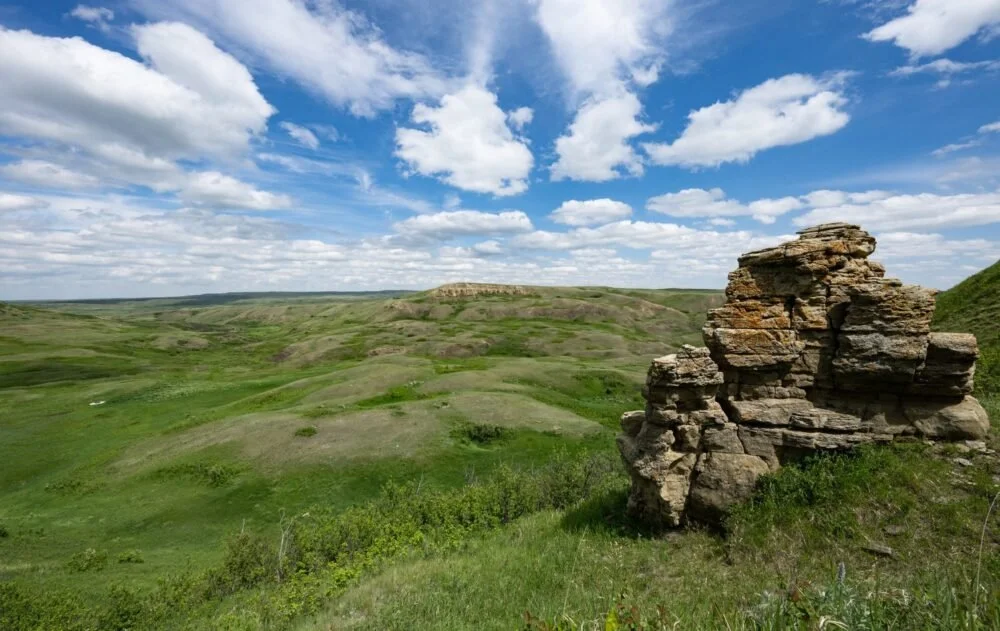Water levels in the Oldman River reservoir are the lowest they've ever been since its construction in the early 1990s. The reservoir and the river are responsible for supplying water to a number of local communities, including Lethbridge. The City of Lethbridge said in a release that while there's no immediate danger of being left without an adequate supply of drinkable water in the city, the lower-than-average water levels across southern Alberta is something they are watching closely.
Conservation leaders join forces on largest private grassland project in Canadian history
The Nature Conservancy of Canada (NCC) and Ducks Unlimited Canada (DUC) are working together to conserve one of the largest remaining tracts of intact Prairie grasslands and wetlands in Canada. McIntyre Ranch, located south of Lethbridge, will be conserved through an agreement (conservation easement) between the landowners and the two organizations. This 130-year-old ranch is one of the largest private landholdings in Canada, and spans over 22,000 hectares — an area more than a quarter the size of Calgary.
Hundreds attend irrigation conference in Lethbridge
The 2023 Irrigated Crop Production Update conference included presentations from over one dozen speakers, with topics ranging from updates to irrigation projects, climate change, water quality, scholarships, crop nutrients, and more. The event was the first of its kind since early 2020 and was hosted by Lethbridge College. Senior Research Chair at Lethbridge College Willemijn Appels says it was great to see so many people with different areas of expertise be able to share their knowledge and research with one another.
Pilot project aims to make Lethbridge greener
Lethbridge could become a ‘living city.’ Environment Lethbridge has partnered with Green Communities Canada to become one of its five Living Cities Canada pilot projects. Kathleen Sheppard, Executive Director of Environment Lethbridge, explains that a living city is one that has large amounts of green spaces and green resources. “That can be things like trees, green roofs, rain gardens, community gardens, all of those pieces that really bring some green into the city,” says Sheppard.
Lethbridge voted number one for best tasting water
Lethbridge has been crowned the winner for the best tasting water. Out of nine competing cities at the 2022 American Water Works Association Western Canada Conference, Lethbridge was chosen as number with Jasper and St. Albert coming in behind. An official with the city explains the secret behind the best tasting water. “It’s purely a subjective competition. They have a panel of people that are tasting and sniffing the entries. Some of the things they’re looking for is whether there’s an aftertaste, a chemical aftertaste, or whether there’s an odor that might impact customers experience,” said Doug Kaupp, General Manager of Waster & Wastewater for the city of Lethbridge.
Calgary and Edmonton COVID-19 wastewater readings trending downward
The data from wastewater is considered a better indicator of how a city is doing at this point in the pandemic, particularly at a time when the province is rationing tests to high-risk groups and many people who have contracted COVID-19 are not showing up on provincial case totals. Wastewater testing measures COVID-19 levels across an entire city and officials can get a big picture perspective sooner than relying on just nasal testing.
These aquatic invaders pose a big risk in Alberta
Nicholas Mandrak, a professor at the University of Toronto who has spent much of his career studying invasive fish species in Canada, says impacts on water systems vary by species. Prussian carp, like goldfish and common carp, will uproot vegetation in order to find food. When that happens, the fish kill vegetation that may act as nutrient sinks in sewage lagoons or drinking water ponds.
Testing the waters: Do Regina's asbestos-cement water mains pose a risk?
Snaking beneath Regina's streets are 600 kilometres of water mains built with asbestos-cement. That's about 60 per cent of some 1,000 kilometres of the mains that deliver water to homes around the city. Increasingly, some scientists and communities are questioning the wisdom in having drinking water flowing through pipes constructed from asbestos fibres.









